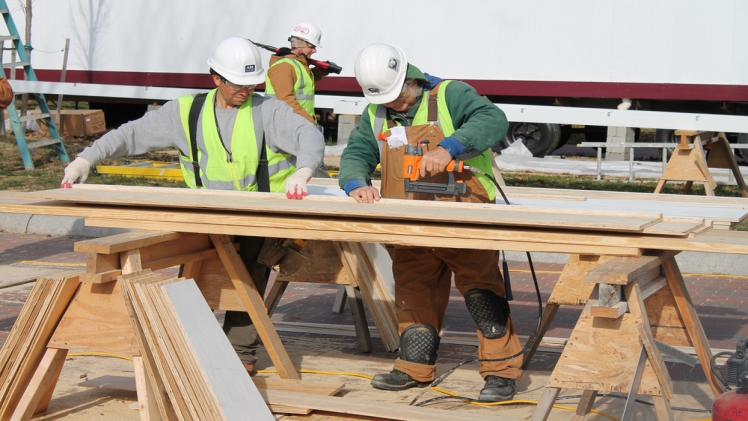Construction jobs are becoming more popular and witnessing growth across industries. If you want to work in the construction industry, then now is the time to do it. According to the US Bureau of Labor Statistics, jobs in the construction industry are projected to grow at a faster than average rate between the years 2019 and 2029.
BLS revealed that 4% more jobs were expected for the construction industry, whereas other sectors got a growth rate of 3.7%.
Working in the construction industry can be easier than in other industries. You can experience a rewarding career, especially when considering the low costs of entry. You’ll need a high school diploma or a GED certificate before you can apply for your internship. To work in the construction industry, you’ll usually need to apply to a technical school, as well as get an apprenticeship.
Construction workers can start earning right from the time they are an apprentice. Depending on the career you choose, for example, an electrician, you’ll need to sit for a licensing exam as well.
Which construction jobs pay well?
Aside from the job you choose, the state you work in can also have a say in how much you earn. Places on the West Coast, such as Alaska and Hawaii, tend to pay higher hourly wages for construction workers. There are places in the Midwest and the Northeast where construction workers earn more than in other states.
Where you earn $34 per hour in Alaska as a construction worker, you can earn $18 in several southern states for the same work. The kind of construction work you do is also a determining factor when it comes to how much you earn. You can expect to earn more if you work in a specialized trade, such as a boilermaker or elevator installer.
If you want to work in the construction industry in the US, then here are the eight careers that pay best:
1. Brickmasons and Blockmasons
As a brick mason, you’ll be expected to build walls, construct sewers, as well as other structures. The kind of materials you’ll be working with includes concrete, glass, tiles, blocks, and cinder. Most of the work you’ll be doing will involve working with mortar so that you can bond bricks as well as blocks together. You may also have to do landscaping projects without using mortar.
Brickmasons and blockmasons earn a median hourly wage of $26.48. Annually, you can expect to earn around $55,080. Plenty of brick mason and block masons are self-employed as well, at 26.8%. The projected growth for this industry, however, is -6.4%
2. Rail Track Laying
Construction workers that specialize in laying train tracks and assembling related equipment fall in this category. They are responsible for installing, repairing, as well as maintaining both train lines, as well as the ties under them. There are limited opportunities in this career, but those that exist, pay well.
As a rail track layer, you can expect to earn a median hourly wage of $27.10. Annually, you can expect to earn around $56,370. Rain track layers aren’t self-employed. There is positive projected growth for this career track, however, at +3.4%.
3. Tapers
If you choose to be a taper, then you’ll need to perform the role of finishing interior walls. This is the step before a wall is painted or wallpaper is applied. People usually work as a taper part-time, as full-time positions are uncommon. The salary of a taper is good. Many tapers are also self-employed, at 17.8%.
Tapers earn a median hourly wage of $28.58. As a taper, you can expect to earn around $59,450 annually. There is, however, a negative projected growth rate for this industry, at -4%.
4. Plumbers, Steamfitters, and Pipefitters
If you choose to work as a plumber, a steamfitter, or a pipefitter, then you’ll need to install and repair structures that carry either liquids or gases. You can either work in a general role, providing your plumbing services to others. Or you can choose to specialize as well and work in more specialized functions, such as in industrial systems.
As a plumber, steamfitter, or pipefitter, you can expect to earn an hourly median wage of $27.08. Annually, you can expect to earn around $56,330. Plumbers primarily work for businesses or organizations, and a low percentage of workers are self-employed. Only about 8.3% of plumbers, pipefitters, and steamfitters are self-employed. There is a positive growth rate for this industry, at +4.3%.
5. Electricians
As an electrician, you’ll need to install, repair, and maintain electrical systems, fixtures, and appliances. This could include phones, lighting, cable, control systems, and more. You can find yourself working in homes, for businesses, in commercial complexes, and more.
Electricians earn a median hourly wage of $27.36. You will earn around $56,900 annually. Only about 5% of electricians are self-employed. This industry also has a positive projected growth rate, at +8.4%.
6. Construction and Building Inspectors
As a construction and building inspector, you’ll need to understand how to read blueprints. You should know about building codes and understand local building laws. It will be your responsibility to ensure that work is completed both safely and legally. You may need to have related experience before you can be certified to work in this industry.
Construction and building inspectors earned a median hourly wage of $30.22. Annually, you can expect to earn around $62,860. Only a low percentage of people in the industry are self-employed, at 6.8%. There is also a positive growth rate for this industry, at +3.2%.
7. Boilermakers
As a boilermaker, you will need to assemble as well as maintain steam boilers. These are what help heat buildings and can also be used to generate electricity. You’ll need to construct as well as assemble fittings, regulators, valves, and more.
Boilermakers earn a median hourly wage of $31.42 and an annual median wage of $65,360. There aren’t many positions available in this industry, but there is a positive growth rate for employment, at +0.9%.
8. Elevator and Escalator Installers
If you want to work in installing, repairing, and repairing escalators, you can expect to earn well. You’ll find yourself working in hotels, malls, office buildings, as well as high-rise complexes. You will also need to work in tight, confined spaces from time to time. Such work brings considerable compensation as well.
As an elevator and escalator installer, you’ll earn a median hourly wage of $42.57. Annually, you can expect to earn around $88,540. Although there are no self-employed people in this industry, there is a positive growth expected for employment, at +6.6%.
Conclusion
These are the eight best-paying construction jobs in the US. As a contractor, you should also consider thinking about insurance for contractors. This is as, through your career, you’re exposed to certain risks, such as business disruptions or being sued by a client. During such times, contractor liability insurance can help you. If you want to learn more about insurance for contractors, like general liability insurance, then click here.

